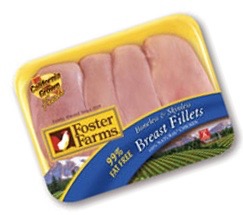Lynne Terry of The Oregonian writes in a comprehensive feature that over the course of a decade, hundreds of people from Eugene to Baker City to Portland and Seattle were struck by bouts of food poisoning so severe they fled to their doctors or emergency rooms for treatment.
 They had no idea what made them sick. But federal regulators did.
They had no idea what made them sick. But federal regulators did.
Oregon and Washington public health officials repeatedly told the U.S. Department of Agriculture they had linked salmonella outbreaks in 2004, 2009 and 2012 to Foster Farms chicken.
State officials pushed federal regulators to act, but salmonella-tainted chicken flowed into grocery stores, first in the Northwest, then across the country. Oregon investigators became so familiar with the culprit they gave it a name: the Foster Farms strain.
The outbreaks tied by state health officials to Foster Farms first occurred in Oregon and Washington. Then in 2012, illnesses spread to almost a dozen states. The next year, a new outbreak emerged that sickened more than 600 people across the country.
Much has been written about that last 16-month ordeal and the USDA’s slow response. But the way the federal agency handled it was not an isolated case, an investigation by The Oregonian/OregonLive has found.
Time after time dating to 2004, Oregon and Washington officials alerted the USDA’s food safety agency about salmonella illnesses, but the federal government chose not to warn the public or ask Foster Farms for a recall.
 With no reason to worry, people kept eating contaminated chicken.
With no reason to worry, people kept eating contaminated chicken.
Foster Farms processes hundreds of thousands of birds a day, and only a small fraction of its customers ever got sick.
But from 2004 through 2014, state or Centers for Disease Control and Prevention officials identified nearly 1,000 infections they said were linked to Foster Farms chicken in four separate outbreaks. About 300 of those cases occurred in Oregon and Washington. The overall toll was possibly much higher. The CDC estimates that for every confirmed salmonella infection, more than 29 go unreported.
The Oregonian/OregonLive reviewed thousands of pages of government records related to Foster Farms and interviewed dozens of health officials, inspectors, food safety experts and federal managers for this story. The records and interviews reveal for the first time an agency that over a 10-year span had repeatedly failed to protect consumers when confronting one of the nation’s largest poultry processors.
During that time, the USDA’s Food Safety and Inspection Service issued hundreds of citations at the company’s sprawling plant in Kelso, Washington. But the agency allowed the plant to operate even though people kept getting sick.
Since the last outbreak ended, no known illnesses have been tied to the company, the largest poultry processor in the West. Foster Farms says it now has one of the lowest salmonella rates in the industry, having invested tens of millions of dollars to improve its plants and procedures.
It’s a different story at the USDA.
The agency has boosted its food safety budget and has made some strides to protect consumers, including introducing stricter standards for salmonella and ordering more random tests.
But many of the same practices and cultural hurdles that contributed to the way the agency handled public health concerns during that 10-year span remain in place today.
 USDA officials are so worried about being sued by companies that they’ve set a high bar for evidence, even rejecting samples of tainted chicken that state health agencies believed would help clinch their case, records and interviews show.
USDA officials are so worried about being sued by companies that they’ve set a high bar for evidence, even rejecting samples of tainted chicken that state health agencies believed would help clinch their case, records and interviews show.
Union officials said the government inspectors they represent are pressured to go easy on food processors, citing one notable case in which the USDA transferred an inspector after Foster Farms complained he wrote too many citations. And after strong pushback from Foster Farms, the USDA retracted a reference in a public document that unequivocally linked the company to illnesses in 2004, a move that baffled state health officials who described the investigation as “rock solid.”
And there’s much more, including USDA’s unwritten rules for going public at http://www.oregonlive.com/usda-salmonella/#incart_m-rpt-1.
